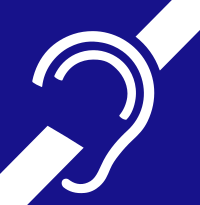
Photo from wikipedia
OBJECTIVE Worldwide, 1.1 billion young people are at risk of developing hearing loss due to unsafe listening. The World Health Organization plans a global health campaign to promote behavior change.… Click to show full abstract
OBJECTIVE Worldwide, 1.1 billion young people are at risk of developing hearing loss due to unsafe listening. The World Health Organization plans a global health campaign to promote behavior change. In an effort to develop effective evidence-based interventions, this study identifies modifiable factors that influence listening habits. METHODS Online survey among 1019 individuals aged 18-35. The questionnaire was based on theories of behavior change. RESULTS Individuals not contemplating change showed a lack of knowledge, tended not to feel particularly at risk, and did not see the benefits of preventive measures. Conversely, those considering a change perceived more barriers (e.g., lack of information on how to act,). Self-efficacy was shown to play an ambivalent role. CONCLUSION Four factors that can be influenced by a health communication intervention were identified: risk perception, perceived safe listening level due to a lack of symptoms, knowledge, and perceived benefits and barriers, in particular perceived loss of pleasure. PRACTICE IMPLICATIONS The first aspects can be influenced through health communication interventions. Influencing the perceived loss of pleasure additionally requires an analysis of competing pressures. To support and not exceedingly burden the individual, we further suggest to address environmental aspects (e.g., policies).
Journal Title: Patient education and counseling
Year Published: 2019
Link to full text (if available)
Share on Social Media: Sign Up to like & get
recommendations!